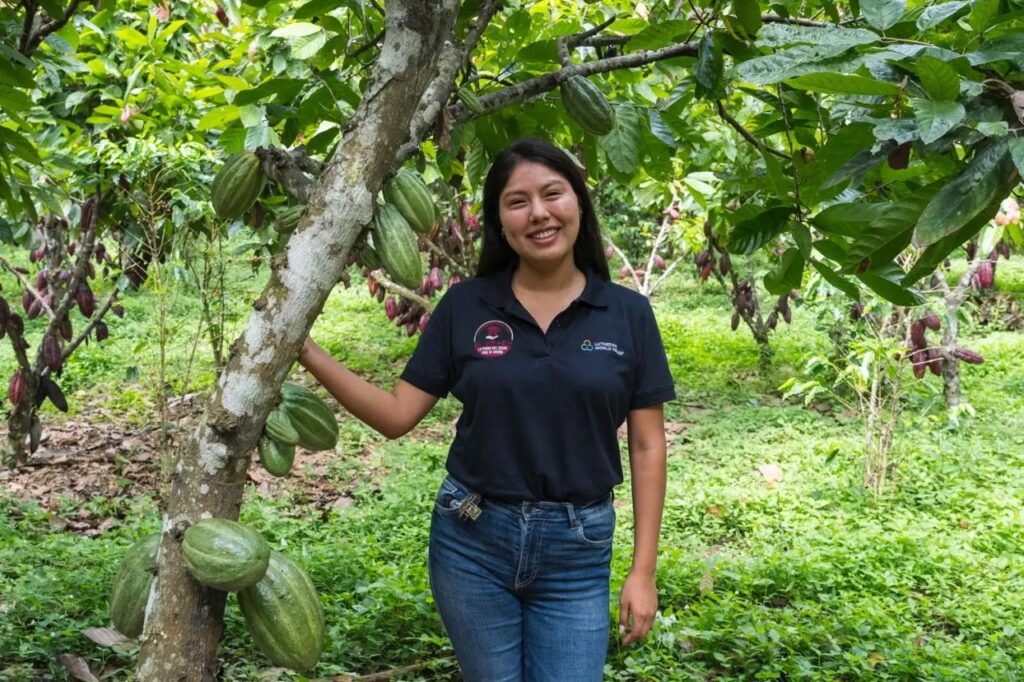
PAMELA HILARIO Y LAS MUJERES QUE VALEN ORO
Con 25 años, la joven contadora emigra de Lima al VRAEM y se enamora de un proyecto que visibiliza el trabajo de mujeres cacaoteras.

Con 25 años, la joven contadora emigra de Lima al VRAEM y se enamora de un proyecto que visibiliza el trabajo de mujeres cacaoteras.
Escribe Daniel Quintero (IG @danielquintero)
En 2017, la productora de cacao Emma Méndez inició el proyecto Qori Warmi (Mujer de Oro en quechua) en la zona de La Florida, Mantaro, ella buscaba con el cacao salir del círculo de violencia. Un par de años después, Pamela llega al VRAEM en 2019, impulsada por su curiosidad. Allí, es cautivada por las mujeres de oro y desde entonces gestiona proyectos de mejora en la cadena productiva del cacao.
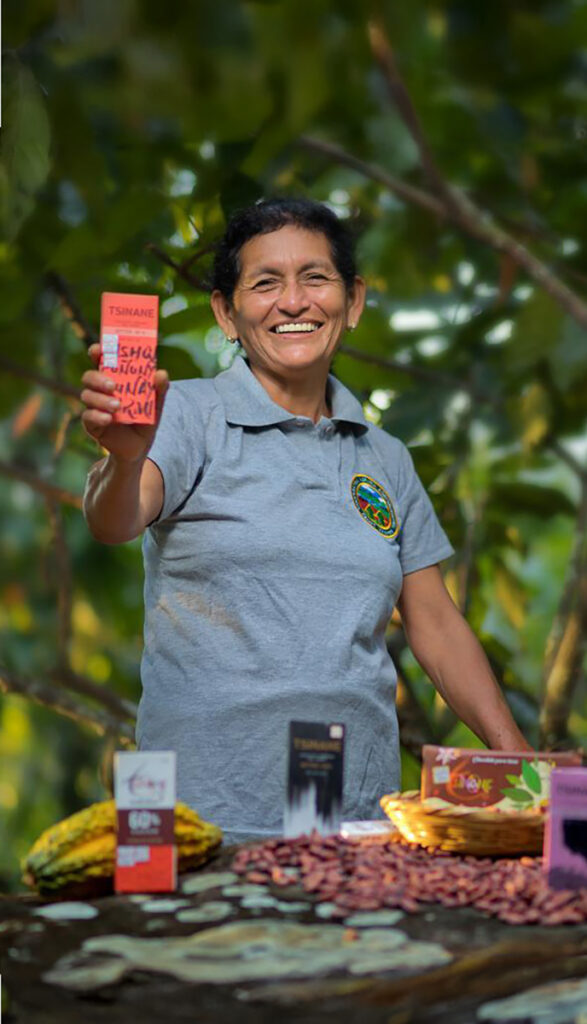
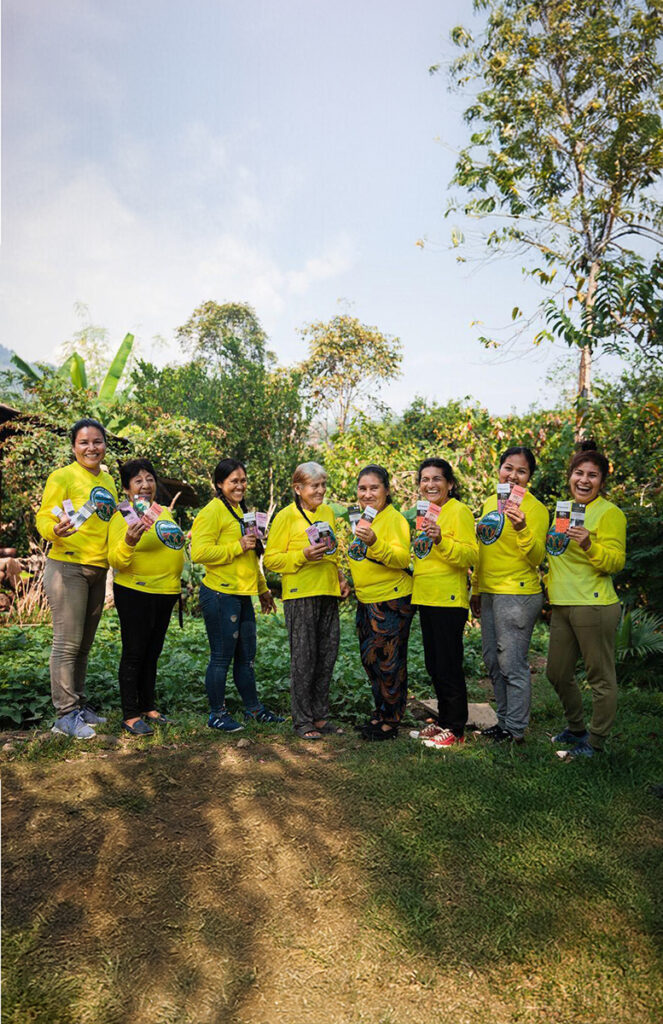

Pamela Hilario, contadora de profesión, nació y creció en Lima. A los 25 años, se mudó al VRAEM (Valle de los Ríos Apurímac, Ene y Mantaro), llamada por el proyecto Qori Warmi llega de la mano de la ONG Lutheran World Relief. Dejó atrás muchas comodidades en la ciudad para conocer de cerca el trabajo de estas mujeres. Al llegar, se encontró con una realidad distinta a la idea romántica de la Amazonía que se tiene en la ciudad. Desde entonces, es la gerente de la cooperativa Qori Warmi.
Qori Warmi nació con el objetivo de romper el ciclo de machismo predominante en las organizaciones que ofrecían proyectos de desarrollo en el campo. Las mujeres se preguntaban: “¿Por qué siempre vienen a enseñar a mi esposo cómo trabajar en el campo, si yo también hago el trabajo? ¿Por qué no nos permiten participar? ¿Por qué no nos enseñan a nosotras? ¿Por qué no tenemos la oportunidad de salir a pasantías y aprender?”, nos explica Pamela. Hoy, la organización agrupa a 120 socias, de las cuales 78 están certificadas como productoras orgánicas. Juntas procesan entre 5 y 10 toneladas de cacao fino de aroma, manejando cuidadosamente la cosecha y la postcosecha. Esto ha mejorado significativamente la calidad de vida de ellas y sus familias.
Pamela reconoció una necesidad urgente en la zona del VRAEM: apoyar a mujeres que desean dedicarse a un trabajo lícito, un desafío considerable en una región donde la siembra de coca ha sido dominante durante muchos años, y que el nuevo oficio les permita, como ella dice, “dormir bien por las noches” y poder sostener a sus familias. “Qori Warmi trabaja en la calidad, por lo que siempre hemos pagado por encima del precio del mercado (de 30 a 50% más). Esto ofrece a las productoras una razón para considerar dejar la coca y cultivar cacao, pero no cualquier cacao, sino el fino de aroma que ya tienen en sus parcelas, a menudo sin saberlo”, explica Hilario.
Tsinane, que se pronuncia “tshinani” y significa mujer en asháninca (trabajan con socias de comunidades nativas ashánincas), nace del sueño de lograr un relevo generacional en el cultivo de cacao. Las mujeres de la cooperativa tienen una media de 55 años, muchas sin haber tenido la oportunidad de estudiar una carrera profesional, dedicándose exclusivamente al campo. Tsinane surge con la idea de “si tenemos un muy buen cacao, por qué no se podrían exportar derivados y tabletas terminadas al extranjero, contando la historia de vida de todas las socias en la zona”, agrega Hilario.
La ONG DEVIDA donó las máquinas y Tsinane ha establecido una planta de procesamiento de cacao. Esto permite que los hijos de las socias trabajen allí, evitando que tengan que emigrar a Lima, Ayacucho, Huancayo o Junín para realizar prácticas profesionales, logrando que se queden y puedan sacar adelante su lugar de origen. Hoy se comercializan tabletas de diversos porcentajes que han ganado premios en los International Chocolate Awards y se consiguen dentro y fuera del Perú. “A veces, las mujeres sentimos una pequeña voz que nos dice que no lograremos las cosas debido a la sociedad en la que vivimos, Tsinane y Qori Warmi están cambiando esto, permitiendo que las socias, sus hijas y sus familias sigan apostando por la cooperativa. Están demostrando que en el VRAEM no solo se cultiva coca, también hay cacao, y un muy buen cacao, cultivado por miles de mujeres que trabajan diariamente para hacer realidad su sueño de tener un futuro sostenible para ellas y sus familias», puntualiza Pamela Hilario.

Words by Daniel Quintero (IG @danielquintero)
In 2017, cacao producer Emma Méndez started the Qori Warmi (Woman of Gold in quechua) project in the La Florida, Mantaro area, seeking to use cacao to break free from the cycle of violence. A couple of years later, driven by curiosity, Pamela arrived at the VRAEM in 2019. There, she was captivated by the women of gold, and since then, she has been managing projects to improve the cacao production chain.
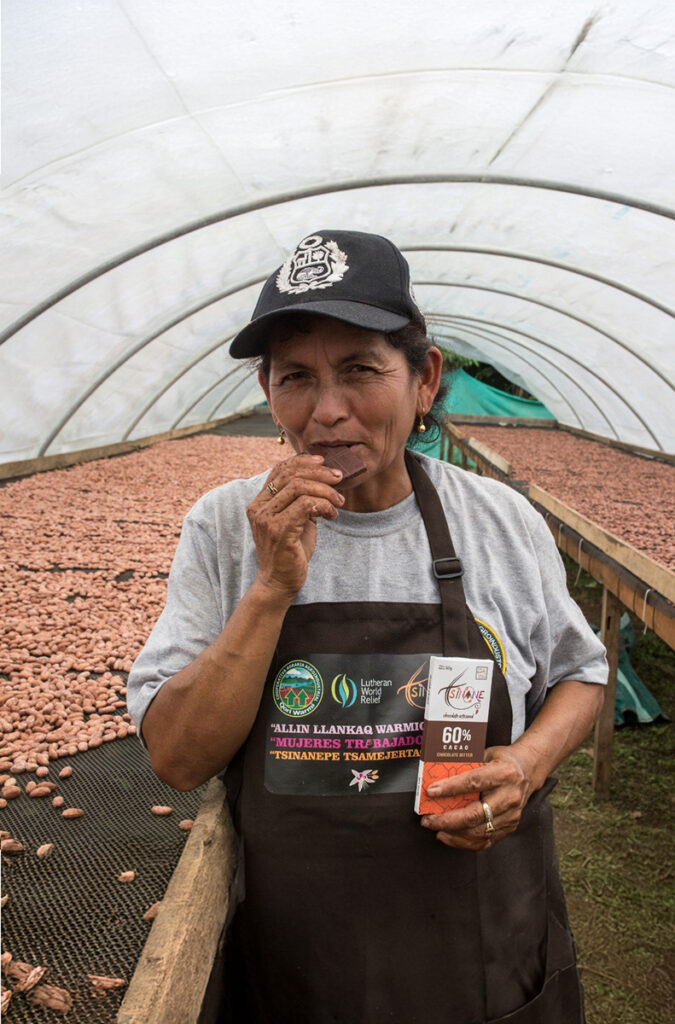
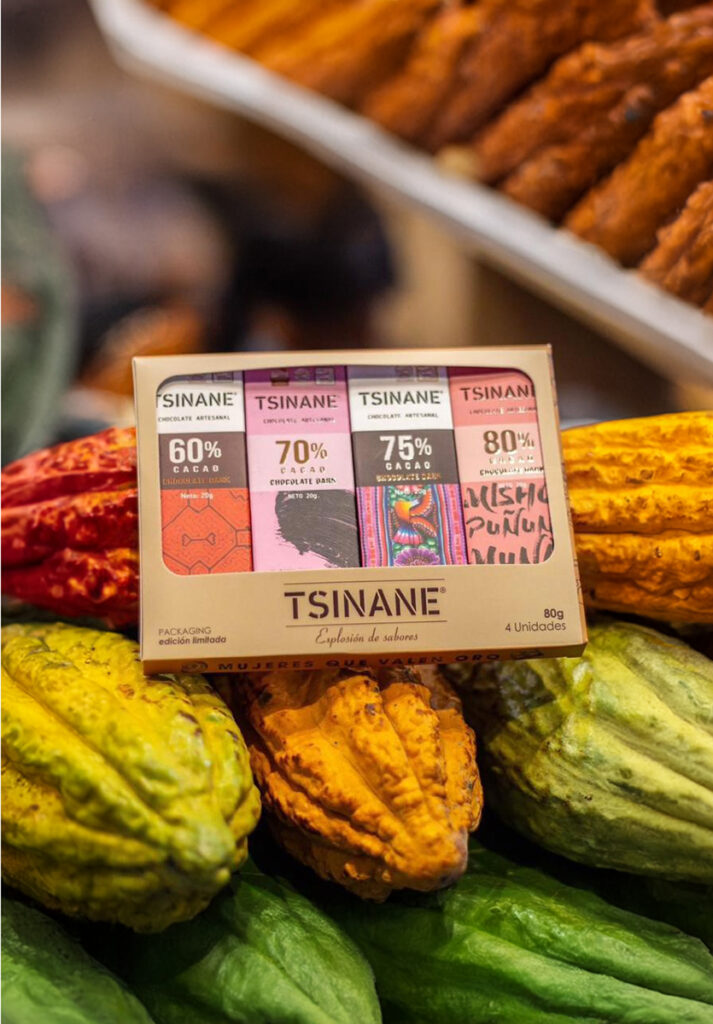
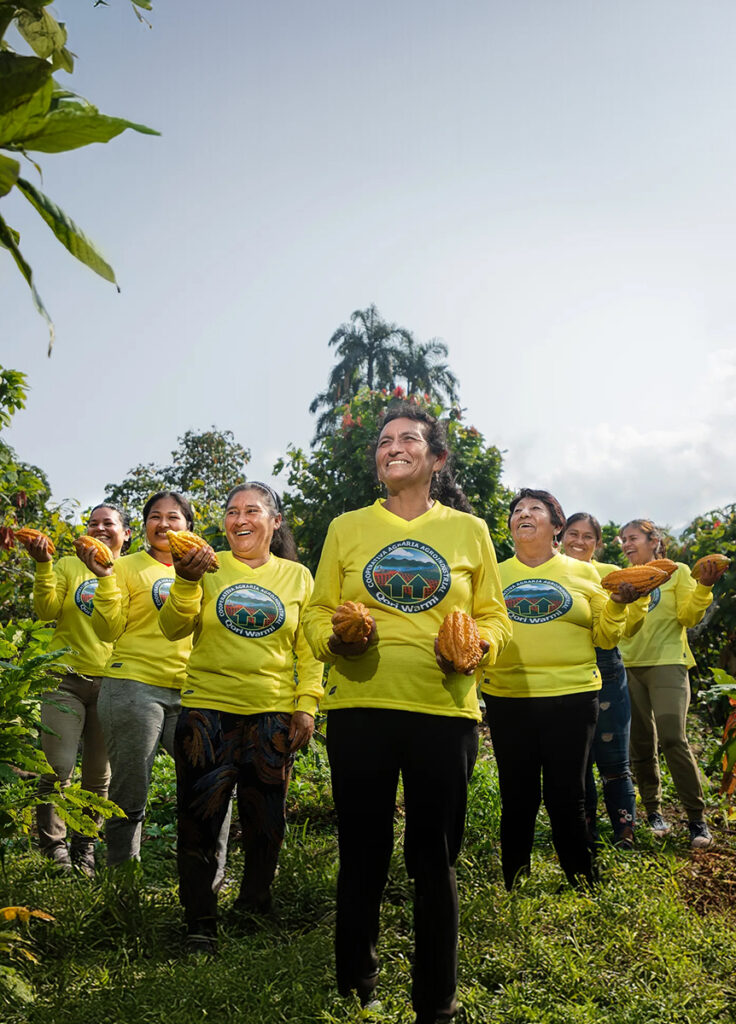
Pamela Hilario, an accountant by profession, was born and raised in Lima. At 25, she moved to the VRAEM (Valley of the Apurímac, Ene, and Mantaro Rivers), drawn by the Qori Warmi project, and arrived through the NGO Lutheran World Relief. She left behind many comforts of the city to get to know firsthand the work of these women. Upon arrival, she encountered a reality quite different from the romanticized idea of the Amazon held in the city. Since then, she has been the manager of the Qori Warmi cooperative.
Qori Warmi was born to break the cycle of machismo prevalent in organizations offering development projects in the field. The women would ask themselves, «Why do they always come to teach my husband how to work in the field when I do the work, too? Why aren’t we allowed to participate? Why don’t they teach us? Why don’t we have the opportunity to go on internships and learn?» Pamela explains. Today, the organization comprises 120 members, 78 certified as organic producers. Together, they process between 5 and 10 tons of fine aromatic cacao, carefully managing the harvest and post-harvest. This has significantly improved the quality of life for them and their families.
Pamela recognized an urgent need in the VRAEM area: to support women who wish to engage in lawful work, a considerable challenge in a region where coca cultivation has been dominant for many years. As she says, this enables them to pursue lawful work that allows them «to sleep well at night» and to support their families. «Qori Warmi focuses on quality, so we have always paid above market price (30 to 50% more). Which gives producers a reason to consider leaving coca behind and cultivating cacao, but not just any cacao, the fine aroma cacao they already have in their plots, often without knowing it,» Hilario explains.
Tsinane, pronounced «tshinani» and meaning woman in Asháninca, works with members of Asháninca native communities. It was born from the dream of achieving generational renewal in cacao cultivation. The women in the cooperative are, on average, 55 years old, many of whom have never had the opportunity to pursue a professional career and have dedicated themselves exclusively to farming. Tsinane emerges with the idea: «If we have very good cacao, why couldn’t we export derivatives and finished bars abroad, telling the life stories of all the members in the area,» Hilario adds.
The NGODEVIDA donated the machines, and Tsinane has established a cacao processing plant allowing the children of the members to work there, preventing them from having to migrate to Lima, Ayacucho, Huancayo, or Junín for internships, enabling them to stay and support their place of origin. Today, chocolate bars of various percentages are marketed, having won awards at the International Chocolate Awards, and are available both within and outside of Peru. «Sometimes, women hear a small voice that tells us we won’t achieve things because of the society we live in. Tsinane and Qori Warmi are changing this, allowing the members, their daughters, and their families to continue betting on the cooperative. They are proving that in the VRAEM, it’s not just coca that is grown; there is also cacao, and a very good one, cultivated by thousands of women who work daily to make their dream of a sustainable future for themselves and their families a reality,» Pamela concludes.
La periodista Argot Murelius nos recomienda dónde comer y beber más allá del bullicio de la ciudad que será sede de los World’s 50 Best Restaurants.
Leer másDiego Muñoz, el chef de Navegante (Punta Hermosa) y Oroya (Madrid), nos comparte sus lugares favoritos para comer rico en el distrito playero del sur todo año.
Leer másEn Bogotá la gastronomía no para de evolucionar. Estuvimos allí y aprovechamos para ver qué novedades presenta. Aquí una guía de cafés, bares, restaurantes y mercados.
Leer más